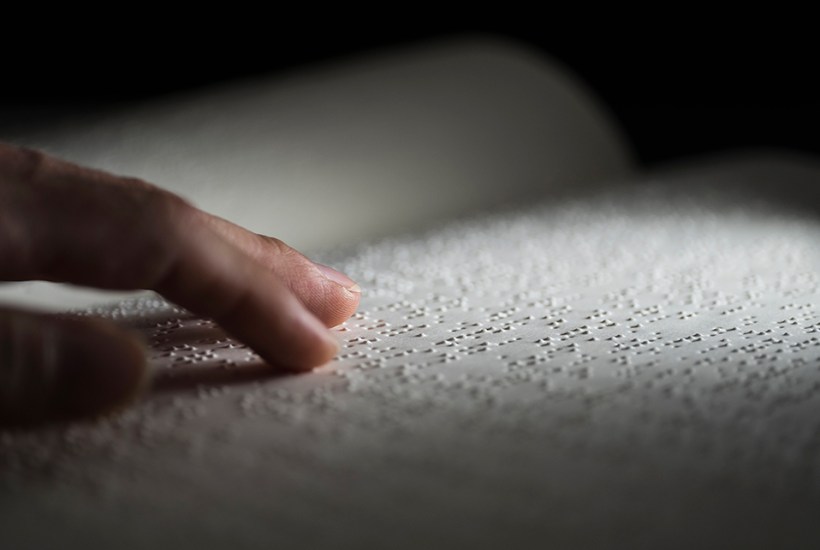To give us a sense of precisely how blind Selina Mills is she asks us to cover our right eye completely with our right hand and put a fist up in front of our left eye, so it blocks our central sight. ‘Now imagine the remaining sight is murky and blurry, as if covered in Vaseline or clingfilm.’
That really is quite blind. Born completely blind in one eye (a hand-painted glass eye was fitted when she was ten), Mills has been gradually losing sight in the other. Now, with just 15 per cent of her sight left, she is ‘legally blind’ and has had a social services person round to her house to give her ‘cane-training’, including a choice of cane tips (‘pencil’, ‘marshmallow’, or ‘rolling marshmallow’), and lessons on how to swish efficiently. What she most misses, she tells us, is the colour blue, which she now sees as ‘a sort of dirty-elephant-grey’.
Happily married to an ‘eccentric Oxford academic’, as she fondly describes her husband, who is also her ‘guide dog’, Mills, who has worked as a senior reporter for Reuters and the Daily Telegraph, sets about in this spirited book – part memoir and manifesto, part history of blindness from Neanderthals to Helen Keller – to get this message across to the sighted population: not all blind people are (a) saintly, like St Lucy, (b) visionary, like the mythical Greek seer Tiresias, (c) pitiful and helpless, like John Everett Millais’s ‘Blind Girl’ or (d) tragic, like Oedipus or Mr Rochester.
Of the 350,000 blind people in Britain, the 12 million in the USA and the 250 million in the world with serious visual impairment, the vast majority, she reminds us, are normal people who tread in dog poo (hence, partly, Mills’s own unwillingness to have a genuine guide dog in the house) and live ordinary, non-tragic lives, not existing in ‘blackness’ or ‘darkness’, just not-seeing, which is different. They have precisely the same electrical activity in their brains while dreaming, but those who are blind from birth simply have different references and experiences with which to articulate that brain activity.
Also, she says, please don’t presume to know what blind people want or need. It happened in the 19th century, when sighted people were convinced that blind Louis Braille’s six-dot, one-finger-touch system would not work, and an Edinburgh printer, John Gall, was adamant that his Roman relief alphabet system worked better. Gall managed to get a whole New Testament published in this form, but it didn’t catch on. Braille was always the choice of blind people. And it happens now, when strangers are forever coming up to blind people to suggest apps they must use or telling them about cures they should try. As Oliver Sacks recounted in his famous 1993 New Yorker piece, a blind man from Oklahoma called Virgil became depressed and withdrawn after his sight was restored. He suffered from ‘acute visual fatigue’ and missed the touch world he’d inhabited for so long.
Mills (who is strident, with reason) rejects the theory, common among the sighted, that blind people must have an especially strong sense of touch, hearing or taste. Not necessarily. She certainly enjoys some recent inventions that have enhanced the daily lives of blind people, such as audio description (AD) which runs alongside the dialogue in films. Typical, from Amadeus, is: ‘Mozart’s wife looks at the palms of her hands sadly, and turns away.’ Unintentionally hilarious, from Fifty Shades of Grey: ‘Christian pulls down her underwear. He spanks her bottom. He spanks her again. She smiles.’ This is spoken over the heavy breathing ‘in a bored English voice with the enthusiasm of someone reading their tax return’. But blind people, Mills writes, don’t want to be bombarded with news about the latest gadgets. Nor do they like it when you make a fuss of their guide dog and take no notice of them.
There’s one invention – speech-to-text technology – which Mills has embraced, but which appears not to work at all well. The book is riddled with typos (‘litergical’, ‘hypocrasy’) and non-grammatical sentences that are sometimes gobbledygook. It doesn’t do Mills any favours that this kind of thing found its way into the final version:
Missionaries in Africa and China relied heavily on Moon As we will see, type as it was easy for the sighted to translate for ‘natives’.
Or this:
I hate the idea that blindness is a word which implies that blind people are entirely relying on others continues to this day.
Those are just two examples of myriad nonsense sentences which come across as messy and convoluted thinking. One just goes: ‘As much as.’ This editorial sloppiness has the effect of making blindness seem far more pitiful than it is.
Got something to add? Join the discussion and comment below.
Get 10 issues for just $10
Subscribe to The Spectator Australia today for the next 10 magazine issues, plus full online access, for just $10.
You might disagree with half of it, but you’ll enjoy reading all of it. Try your first month for free, then just $2 a week for the remainder of your first year.








Comments
Don't miss out
Join the conversation with other Spectator Australia readers. Subscribe to leave a comment.
SUBSCRIBEAlready a subscriber? Log in